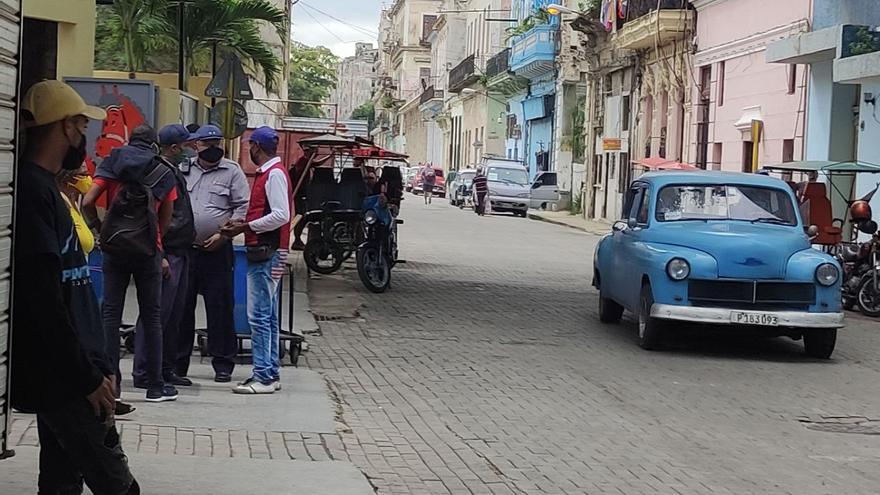
![]() 14ymedio, Havana, December 1, 2021 — Threats from State Security and the deployment of the military throughout main streets in Cuba gripped the population with fear and thwarted the massive protests planned for November 15th (15N), but that same day, there were 79 protests in the country.
14ymedio, Havana, December 1, 2021 — Threats from State Security and the deployment of the military throughout main streets in Cuba gripped the population with fear and thwarted the massive protests planned for November 15th (15N), but that same day, there were 79 protests in the country.
These were logged by the Cuban Conflict Observatory (OCC) in its last report, published on Wednesday, which includes a video that provides proof of some of those protests, filmed in motion or shared as photographs on social media.
The Miami-based organization reports 353 protests on the Island in November, 75% (266) of which were motivated by demands for political and civil rights, the remainder (87), were related to economic and social rights, such as exploitation of labor, excessive fines, femicide, the poor conditions in prisons or high prices for the basic food basket.
“That the protests have continued is significant, if you consider the extraordinary repression exerted against the population, the exemplary trials with extreme sentences for alleged and inconsequential crimes committed on July 11th, the threats of terminating the parental authority of those who are jailed for political reasons, and the impunity with which paramilitary groups, in videos shared on social media, flaunted their willingness to exert violence against any protester using firearms and blunt objects,” stated OCC.
The slight increase in protests last month, compared with those that occurred in October (345), maintains the upward trend since the Observatory began monitoring them, in September of 2020, when they logged 42 protests.
“Especially since the Government believed they’d quashed the resistance from the cultural sector with the assault on the headquarters of Movimiento San Isidro on November 26, 2020,” noted OCC. Since then, they continued, several dates have marked the “growing ungovernability” in Cuba, among which are included, clearly, 11J, but also 15N.
The NGO asserts that day was “the first time in 62 years that the Ministry of the Interior, its paramilitary forces and the Federal Armed Forces found themselves in need of a complete occupation of all urban and many rural areas, through police operations, deployment of member of State Security dressed as civilians, acts of repudiation, messages containing threats and selective disabling of telephone lines.”
To dissuade people from going out, the document states, “the Government continues announcing arbitrary and excessive sentences (including those against dozens of minors) for the July 11th (11J) protesters, fascist beatings on the streets and in prisons, threats of terminating the parental authority of possible protesters, psychological torture of the detained and their family members, and also pressuring known dissidents to leave the country.”
As a result, it concludes that “the reference for deciding to whom the victory of 15N belongs is not the number of citizens that went out to the streets, but rather, the number of effective troops, police, paramilitaries and resources the Government deemed necessary to avoid a new July 11th,” due to the financial and political cost of that operation, which OCC described as “devastating, nationally and internationally.”
As an example, the NGO stated that the repression previously exercised by the Cuban Government resulted in November 15 being closely observed by the European Union and the UN Human Rights Council.
“The Cuban reality is not lost potential investors, and even tourists, whom the government wishes to attract,” they reason in the report. “Who is more credible and strong today? The government which can barely mobilize a few of the dissidents’ neighbors to carry out an act of repudiation? Or civil society, ever more alienated from the government and the current governing regime?” they ask, and follow with this assertion, “The government didn’t ensure its own future in November, it placed it at even greater peril.”
In the report, the OCC exalts the “successes” of Archipiélago since it was created, in August, among these, demonstrating that “the people were willing to join a civic call to action on 15N and that the Government had no response to the citizen unrest other than the most obscene repression.”
Nonetheless, despite the space dedicated to the opposition platform in the document, there was no mention of its most visible leader, playwright Yunior García Aguilera, who surprisingly left Cuba for Madrid on November 16th, two days after State Security deployed a strong operation and organized agg acts of repudiation at the artist’s own house, preventing him from marching alone, as he had announced.
The report also does not reference the regime’s evident strategy toward the most recent dissidents: forced exile. The most recent of these being controversial rapper Denis Solís, who traveled to Serbia via Moscow last Saturday.
In addition to García Aguilera and Solís, artist Hamlet Lavastida and poet Katherine Biquet also find themselves in the same situation, today in Europe, as are Tania Bruguera, Camila Lobón, Claudia Genlui, Alfredo Martínez and Eliexer Márquez El Funky, one of the performers of Patria y Vida.
Translated by: Silvia Suárez
____________
COLLABORATE WITH OUR WORK: The 14ymedio team is committed to practicing serious journalism that reflects Cuba’s reality in all its depth. Thank you for joining us on this long journey. We invite you to continue supporting us by becoming a member of 14ymedio now. Together we can continue transforming journalism in Cuba.
